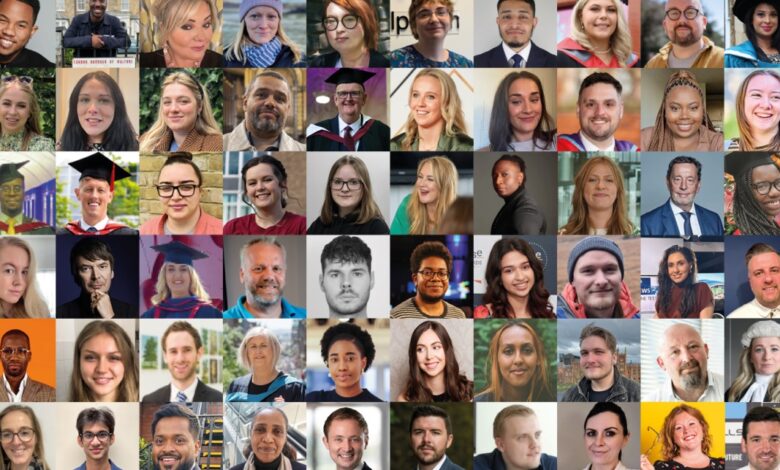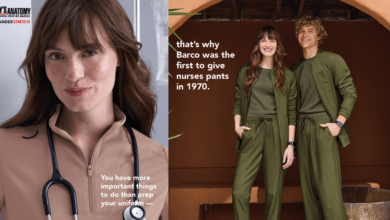Mental health nurse among the faces of a new university campaign

A mental health nurse whose husband was held prisoner by the Taliban is part of a new campaign highlighting the success stories of students who were the first in their family to attend university.
A deaf nurse and two midwives, including a former Student Nursing Times Awards winner, also feature on the list of inspiring graduates.
“Being a first-generation student has helped me become a role model for our kids and grandchildren”
Kelly Cornwell
The new 100 Faces national campaign is being led by Universities UK and features Kelly Cornwell who is from Lancashire and graduated in November 2023 from the University of Cumbria.
Her university noted that Ms Cornwell had to overcome a range of significant challenges to both study and then graduate with her degree in nursing.
Family commitments over the years delayed her dreams to train as a nurse but she finally went on to study mental health nursing, graduating with a first-class degree last year, said the university.
It added that her final year of study was significantly disrupted when her husband, a humanitarian aid worker, was detained by the Taliban in Afghanistan.
Shortly after, Ms Cornwell herself had to undergo major surgery, which forced her to put on hold a professional placement that she had to complete to be eligible to complete her degree.
Following her own recovery and using the skills learned at university, she successfully fought for her husband’s release and he was freed just a few weeks before her graduation in Carlisle last November.
She has now started her nursing career, helping those accessing support at a substance misuse detox facility in Lancaster.
Ms Cornwell said: “A mature first-generation student going to university can be a powerful catalyst for personal and societal transformation, unlocking new possibilities and setting the stage for a more enriched and impactful life.
“Everything you learn is universal – all the skills and knowledge you gain can be applied anywhere,” she said.
“I’d been waiting for the moment for years and when the time was right, I wasn’t going to let anything hold me back,” said Ms Cornwell.
“University has given me the chance to acquire formal education and skills I may not have been able to get earlier due to family obligations. This empowerment has led to increased self-confidence.
She added: “Being a first-generation student has helped me become a role model for our kids and grandchildren, showing them how important lifelong learning is.”
When she is not working, she is also putting her expertise to good use as a volunteer serving as a safeguarding officer and mental health advisor at her son’s taekwondo club.
The 100 Faces campaign aims to champion and celebrate the positive impact of ‘first-in-the-family’ graduates to highlight the need for access to support and ensure future generations can follow them.
Famous examples flagged by Universities UK include England footballer Beth Mead, Lord David Blunkett, Nobel Prize winner Sir Chris Pissarides and actor Amit Shah.
As part of the campaign, Universities UK carried out a survey that it said revealed the transformative impact of going to university on ambition.
For example, the survey found 73% of first-in-the-family students agreed that their degree gave them the confidence to apply for jobs without feeling like an imposter.
“We really do need to see an improvement in maintenance support to support those from the least privileged backgrounds”
Vivienne Stern
However, the survey also highlighted the reliance of first-in-the-family students on depreciating financial support, said the body representing higher education institutions.
Without financial support, it said over 40% of first-in-the-family graduates could not have afforded to go to university at all – equivalent to around 1.1 million 24–40-year-olds in England and Wales.
With financial provisions dwindling and the cost of living rising, Universities UK is calling for the government to reinstate maintenance grants and increase support for future students.
Non-repayable maintenance grants were replaced by repayable loans in England in 2016, although grants continue to operate in Wales, Scotland and for some healthcare courses in England.
The findings come from extensive new research, commissioned by Universities UK, into the experiences of 6,004 UK graduates and 4,006 non-graduates, aged 24-40, from across the UK.
Vivienne Stern, chief executive of Universities UK, said: “There are those who say that too many people go to university. I disagree. These stories tell you why.
“In this country, you are still twice as likely to go to university if you are from the wealthiest background, compared to the least wealthy. That’s not right,” she said.
She added: “I believe we have a responsibility to keep working to ensure a wider range of people in this country get access to the potentially transformative experience of going to university.
“For that to happen, we really do need to see an improvement in maintenance support to support those from the least privileged backgrounds,” she said.
Professor Julie Mennell, vice chancellor of the University of Cumbria, said: “The Universities UK campaign is an important one, showcasing how higher education can transform lives and livelihoods.”

100 Faces campaign
Three other nurses and midwives are also featured on the list of 100 Faces. These included Caitlin Tanner, a Swansea University PhD student, who is profoundly deaf and wears cochlear implants.
She graduated with a first in adult nursing in 2019 and qualified into an intensive care unit, where she worked for three-and-a-half years during the Covid-19 pandemic.
She then applied for and was awarded a scholarship to pursue research on the experiences of deaf nurses within the UK.
Meanwhile, Michelle Pool took a three-week elective placement in a maternity hospital in Tanzania during 2023, which reshaped her outlook on midwifery and the type of midwife she aspired to be.
She said the trip revealed the stark reality of midwifery care outside of the UK and challenged her thinking around Black, Asian and minority ethnic women in the UK.
She is now committed to fighting for the empowerment of BAME women and to ensure they receive care that reflects the ethos of the NHS – and that every woman has the right to receive.
Former Student Nursing Times Awards winner, Nicolette Porter, who has autism, is passionate about showing how neurodivergence is not incompatible with a successful career in healthcare.
Ms Porter, from Ilford in Essex, achieved a first in midwifery at Middlesex University and is currently working part-time for the NHS while doing an MSc in Women’s Health at University College London.
In 2021, she won Student Midwife of the Year category at the Student Nursing Times Awards and, in 2022, was the recipient of a scholarship grant for students of Black African Caribbean heritage.

Nicolette Porter (centre) with her 2021 Student Nursing Times Award







